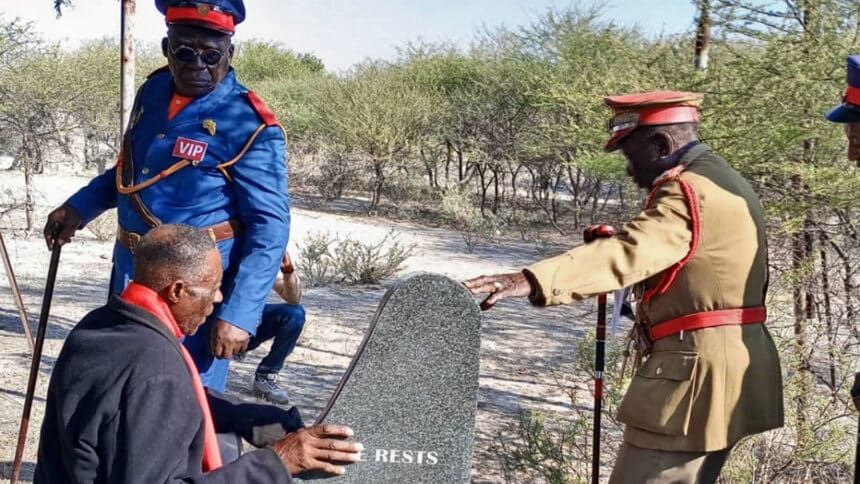Bahehero tribe gathered in Tsau village, in North West District on July 13th for their annual Otjiserandu or Red Flag day in commemoration of 1904 massacre and genocide that almost wiped out their entire tribe from the then German South West Africa, now Namibia.
Otjiserandu is a cultural re-awakening for this tribe as they remember their heroes who fought against the German regime and set them free when they led them as they fled Namibia during the historical genocide they suffered at the hands of the Germans about 120 years ago and settled in some parts on Botswana including North West (Ngamiland), Gantsi and Central districts, in the then Bechuanaland which was under British Protectorate.
Officiating at the event Batawana Paramount Chief, Kgosi Tawana Moremi noted that Otjiserandu reflects on the the scars of genocides and the lessons of the community’s future journey towards victory over hate and injustice, “This dark chapter in history serves as a dark reminder of the horror inflicted upon a proud and resilient community . The resilience and conservancy of the Herero people stand as a testament to their strength and cultural identity.”
Kgosi Tawana added that despite the atrocities inflicted against them, the Herero community remained steadfast in preserving their traditions, languages and heritage and that their ability to withstand torment and survive in diaspora exemplifies a spirit of resilience that has transcended generations, “In the phase of unimaginable hardships they have held onto their cultural identity with pride and determination.”
Otjiserandu symbolises unity and strength of the Herero people and binds them in solidarity and remembrance of their history and according to Kgosi Tawana it is this shared history and cultural commitment that is making the tribe stand.
Imploring the elders to pass on their traditions to the younger generation the chief said; “Herero people have stood tall, united by a shared history and commitment to preserving their culture.
As we reflect on the scars of genocide and the enduring legacy of the Hereros, we are reminded of the importance of preserving our cultural heritage and passing it on to future generations.
The lessons of the past call upon us to embrace our identities, celebrate our diversity and honour sacrifices of those who came before us.”
Speaking at the same event, Ngami member of Parliament, Caterpillar Hikuama reminded the younger generation about the pride of Baherero tribe, which he said was cattle ranching, “We get our financial and economic independence from cattle, let’s not forget that.”
Hikuama further noted that the fact that they arrived in Botswana in latter years than other tribes does not make their status less than that of other citizens.
“The difference is that some tribes arrived earlier and without scars whilst we arrived bearing scars, bleeding and fleeing from death and gun shots from the Germans. But we are grateful for we found shelter here and we are alive, thanks to communities that welcomed us here with open arms.”
This year’s commemorations were held under the theme, “The scars of the genocide, our lessons for a better tomorrow,”














